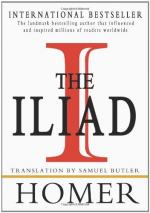|
|
The Iliad Objects/Places
Achilles' horses: Hector rages after these horses named Roan Beauty and Charger. They are of divine origin and paralleled by few.
Achilles' spear: This spear was given to Achilles' father Peleus by Chiron, a centaur renowned for his wisdom and ability in the arts. Not only is this spear blessed because it is of divine origin, but it is also crafted from extra hardy wood.
Aeneas' Horses: Diomedes desires these horses in Book 5. According to him, they are descended from divine stock given to Tros by Zeus for the stealing of Ganymede. Anchises, Aeneas' father, took the offspring from Laomedon, the father of Priam.
Argos: A region near the northeastern part of the Peloponnese.
Athena's dress: Athena, known as a maiden goddess, was frequently honored in Athens with the presentation of a fine dress. Athena's temple, the Parthenon, housed a giant statue of the goddess which was presented with a dress as a form of sacrifice.
Aulis: The Greek fleet's departure point for Troy. The ships had no wind to sail and Artemis demanded the sacrifice of Agamemnon's daughter Iphigenia for passage.
Crete: Long island located at the southern end of the Aegean sea.
Golden apple: The object dedicated 'to the fairest' presented by the goddess Discord at the marriage banquet of Peleus and Thetis.
Greece: The rough geographic area south of the modern Balkans, west of Asia minor and east of the Adriatic sea. Greece is usually considered to extend to the island of Crete, containing the Aegean sea. Most islands within the Aegean are traditionally consider to be 'Greek'.
Greeks: The assailants of Troy. Also known as Argives, Achaeans and Danaans. Any people from the Area known as Greece, speaking a similar language.
Guest-friend: The closest translation of the word 'philos'. This friendship is a complex system of hospitality, family, class and inheritance. A guest-friend could be a relative, a neighbor, a far-away acquaintance or an associate.
Ichor: Full divinities, as opposed to demi-gods or heroes, do not bleed 'blood', but this divine substance.
Ithaca: Odysseus' Island on the western side of Greece bordering the Ionian Sea.
Lycia: Homeland of Trojan Allies in the southern portion of Asia minor.
Mount Ida: A mountain located in Asia minor in Phrygia, southeast of Troy. Zeus goes to the mountain. In some myths, it is located on Crete.
Mount Olympus: The mythical home of the gods and an actual mountain located northeastern coastal Greece. Zeus resides here and all assemblies of the gods take place in his palace.
Mycenae: The home of Agamemnon and modern archaeological site located in the Northeast Peloponnese.
Myrmidons: The 'marines' of Achilles from Phthia.
No man's land: The area containing the line of scrimmage where most of the actual battles take place.
Phalanx: The battle formation most heavily utilized in Late archaic and classical Greece by hoplite armies.
Pylos: A city located in the southwestern part of the Peloponnese.
Rhesus' horses: King Rhesus was king of the Thracians and his horses were famous for their strength and stature. In Book 10, Odysseus and Diomedes raid the Thracian camp and steal these horses.
Salamis: An island located southwest of mainland Greece and east of the Peloponnese.
Scaean gates: The main gates to the city of Troy, the walls of which were built by Poseidon.
Scepter: In the description of Agamemnon's scepter, there is a divine origin. The scepter, already a symbol of power and rank, becomes an object of divine testimony to Agamemnon's rule.
Sparta: A Greek city located in the South central part of the Peloponnese. This city is sacred to Hera and the home of Menelaus.
Storm cloud shield: Zeus' shield which renders projectile weapons useless. Apollo uses it to help Hector when he storms the Greek camp and Athena uses it to protect Achilles before his mother brings him new armor.
Thessaly: A region located on the eastern side of Greece.
Thrace: A region which borders Greece in eaurope at the north of the Adriatic near the eastern most part and Bosporus and Dardanelles.
Trojans: The people from or around the city of Troy.
Troy: A powerful and rich city on the northern coast of Asia minor.




